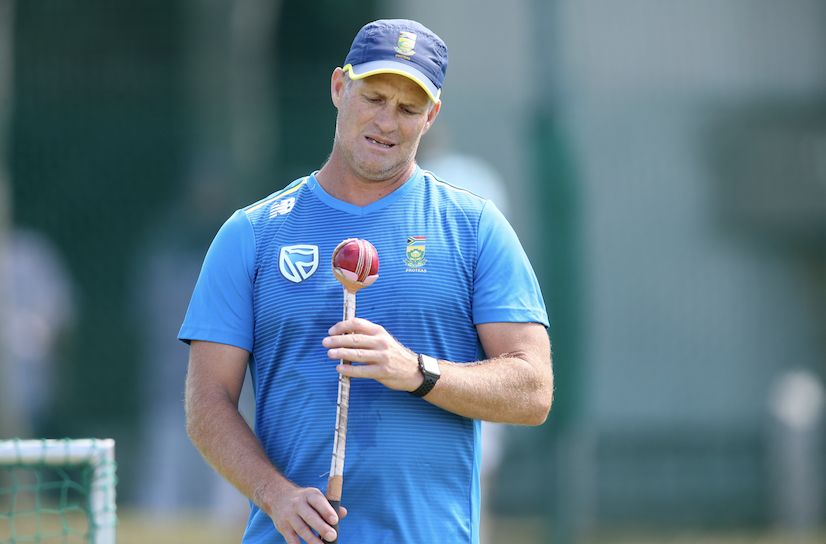The masses are calling for Dale Benkenstein (a man with a magnificent cricketing pedigree) to be fired as Proteas’ batting coach, but SIMON LEWIS believes Benkenstein is not the man to shoulder the blame for the Proteas’ woes with the bat.
It’s easy to point the finger of blame for the Proteas’ inability to put consistent runs together on the shoulders of Dale Benkenstein. He is the batting coach, after all, so it stands to reason that the batsmen’s failures are his failures. Yes?
If we were talking about an amateur club side or a U10, U15 or U19 school side then he might be culpable as the coach because, at those levels, the coach does a lot more actual technique work. Coaches at that level also direct and control the players more, set the tone and tactics.
A misguided coach at that level can even force or bully the players to play in a certain way, at pains of being dropped for disobeying.
READ ALSO: Benkenstein a convenient scapegoat
I doubt the same applies to any professional batsman, and especially not the Proteas’ top-order. Faf du Plessis has a superb record of important Test innings, a superb white ball career at international and domestic level … and he is the Proteas skipper.
Benkenstein won’t be teaching Faf batting technique or bullying him into playing a certain way. No way in hell.
Quinton de Kock? Aiden Markram? Hashim Amla? Dean Elgar? These guys have impressive records, are VERY well paid, and are all strong characters. They have a right to be, based on their batting records.
Of course, they will presumably listen to and work with Benkenstein, collaborate as a playing squad, but the former Dolphins and Durham captain is not going to force them to do something they don’t believe in. Not in a million Sundays.
He also can’t go out and score the runs for them, or manage their shot selection in the middle. At Test level, coaches are advisers.
Benkenstein is known as a highly competitive and motivated captain. He has a winner’s attitude and knows how to take responsibility for decisions as a leader. However, he is also spoken of by past team-mates as a highly consultative captain and leader. He has never been a dictator.
His Test record is non-existent as he never played in Tests, although I always felt he deserved a call-up and would even have been a very good choice as captain. Some readers and commentators point to his ‘relatively poor record’ as a player as a reason why he shouldn’t be the batting coach.
Many of the best coaches (in multiple sports) have been great players, but many great players have been either decent, average or poor players. A coach’s playing record has little relevance to his or her coaching ability – the only thing that might come into play is if the players don’t respect or don’t listen to the coach based on their ‘poor’ or inferior playing record.
If that is the case then it would be the players at fault for their batting failings, not the coach, if they are not listening to him. While the batting has failed, how does one explain, for instance, the good Test performances with the bat of Quinton de Kock, Faf du Plessis and Temba Bavuma over the past year? Were those performances despite Benkenstein or because of him?
The batting or bowling coach needs to observe, tweak, analyse as well as prepare dossiers detailing future opponents and help in reading the pitch and match day conditions, and work with the team on a strategy that is ‘universally’ agreed upon. Presumably, any request by the batsmen would be acted upon by Benkenstein, from researching opponents to extra throwdowns, tweaking a technique or offering a shoulder to ‘cry’ on.
If the players aren’t happy with Benkenstein’s performance or don’t enjoy their relationship with him, then there would need to be consultation to improve the relationship and, if that doesn’t improve the situation, there would need to be a parting of the ways.
However, you cannot base the batsmen’s failure to score runs on Dale Benkenstein’s performance as a coach.
It just doesn’t make sense that the batsmen failing to make runs or the bowlers failing to take wickets (or bowling too loose) should signal the axing of a coach. Hashim Amla’s batting struggles, for instance, have pre-dated Benkenstein’s tenure with the side.
There are four immediate options that spring to mind for those demanding action:
- Fire Benkenstein
- Fire the entire backroom and coaching staff
- Fire 2-3 of the Proteas’ top-order and rebuild with promising young and old talent and give them a chance to find their feet over a six to 12-month period.
- Stand together as a collective and sort the problems out.
Option one has been widely touted on social media, with ‘commentators’ listing a number of former great players who could be brought in as a batting coach. While their records are great, none have the composure and cricketing brain of Benkenstein. They do, however, wear the ‘I’ve been there T-shirt’ and have mountains of experience of actual conditions as well as knowledge of how they got through certain situations. Perhaps that is what the current Proteas expect in their coach, and Benkenstein certainly doesn’t have enough of that in an international context.
It would, I feel, be short-sighted to fire Benkenstein. The ability to do something does not always translate well into being able to show or tell others what to do or how. Great players also have a tendency to not understand how mere mortals can’t ‘just do’ what the great ones used to do.
Options two and three are both disruptive and, in the short time ahead of the World Cup, would be a high-risk strategy. Better the devil you know, sometimes.
Option four is the least disruptive in the short-term and would arguably guarantee the best result for the Proteas. It is also the adult solution. Hopefully, the Proteas’ top-order are also paying attention to the big runs being scored around the country by promising young and older batsmen who are all eager to prove themselves to push for a Proteas call-up.
Option four also relies on a key ingredient in the whole problem with the Proteas’ batting – the fact that the batsmen themselves need to pull finger and start scoring runs, regardless of the opposition or match conditions.
That’s why it’s called Test cricket.
Photo: Shaun Roy/Gallo Images







